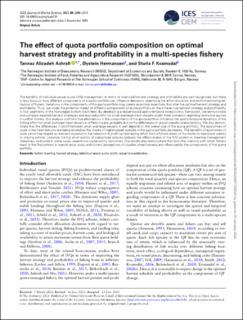| dc.contributor.author | Alizadeh Ashrafi, Tannaz | |
| dc.contributor.author | Hermansen, Øystein | |
| dc.contributor.author | Kvamsdal, Sturla Furunes | |
| dc.date.accessioned | 2024-01-17T15:33:13Z | |
| dc.date.available | 2024-01-17T15:33:13Z | |
| dc.date.created | 2023-11-10T13:46:46Z | |
| dc.date.issued | 2023-09-04 | |
| dc.identifier.citation | ICES Journal of Marine Science. 2023, 80 (8), 2099-2113. | en_US |
| dc.identifier.issn | 1054-3139 | |
| dc.identifier.uri | https://hdl.handle.net/11250/3112297 | |
| dc.description.abstract | The benefits of individual vessel quota (IVQ) management in terms of improved harvest strategy and profitability are well recognized, but there is less focus on how different components of a quota portfolio can influence decisions underlying the effort allocation and profit-maximizing behaviour of fishers. Variations in the components of the quota portfolio may create economic incentives that alter the optimal harvest strategy and profitability. Thus, we study the potential impact of different components of quota portfolio on the intra-annual harvest strategy and profitability in two segments of the Norwegian bottom trawl fleet. By developing a vessel-based spatio-temporal bioeconomic framework, we demonstrate and compare adopted harvest strategies and accrued profits for small and large trawl vessels under three scenarios regarding restrictive quotas in codfish fishery. Our analysis confirms that alternations in the components of the quota portfolio influence the spatio-temporal dynamics of the fishing effort for small and large trawl vessels in different ways, probably due to the differences in vessel-specific characteristics. We also demonstrate that the differences in profit between small and large vessels in part depend on the overall size of the quota portfolio. The economies of scale in the trawl industry are being eroded as the shares of higher-priced species in the quota portfolio decreases. The benefits of economies of scale cannot be reaped as trawlers respond to the reduction in profit by redirecting effort from offshore areas of the Arctic to nearshore waters or staying ashore. Likewise, having small quotas of high-priced species reduces the effectiveness of the IVQ system in meeting management objectives, and could in some cases undermine sustainability outcomes. Our results also demonstrate that both the intensity with which fishers react to the fluctuations in market price levels and fishers’ perceptions of location attractiveness are influenced by the components of the quota portfolio. | en_US |
| dc.language.iso | eng | en_US |
| dc.publisher | Oxford University Press | en_US |
| dc.rights | Navngivelse 4.0 Internasjonal | * |
| dc.rights.uri | http://creativecommons.org/licenses/by/4.0/deed.no | * |
| dc.title | The effect of quota portfolio composition on optimal harvest strategy and profitability in a multi-species fishery | en_US |
| dc.type | Peer reviewed | en_US |
| dc.type | Journal article | en_US |
| dc.description.version | publishedVersion | en_US |
| dc.rights.holder | © The Author(s) 2023 | en_US |
| dc.source.pagenumber | 2099-2113 | en_US |
| dc.source.volume | 80 | en_US |
| dc.source.journal | ICES Journal of Marine Science | en_US |
| dc.source.issue | 8 | en_US |
| dc.identifier.doi | 10.1093/icesjms/fsad135 | |
| dc.identifier.cristin | 2195119 | |
| cristin.ispublished | true | |
| cristin.fulltext | original | |
| cristin.qualitycode | 2 | |

